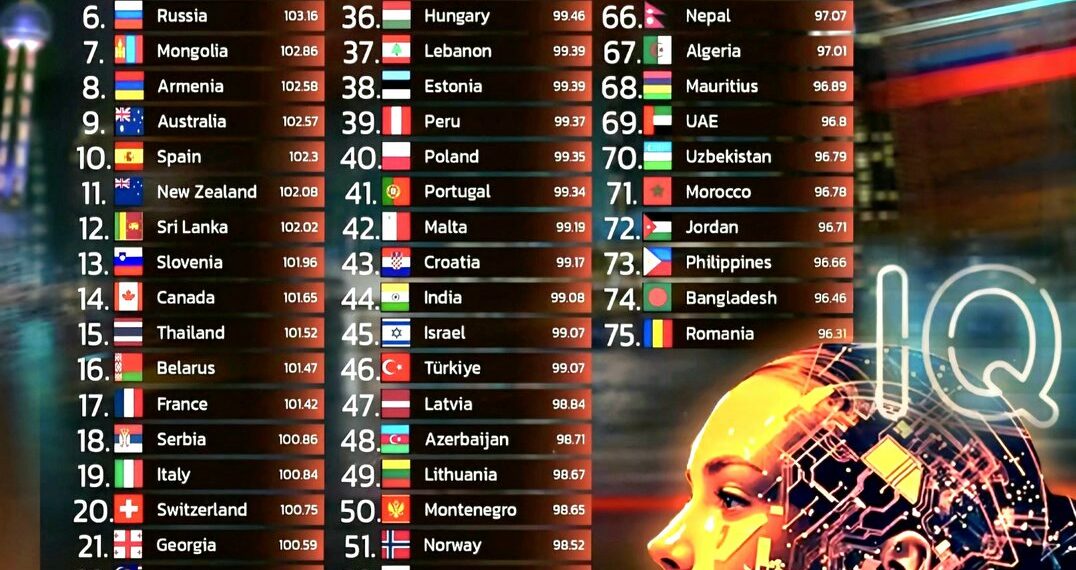Select Language:
Exploring the World’s Intelligence: The Top 75 Countries by Average IQ in 2025
As we move into 2025, a recent study has revealed insights into global intelligence by showcasing the average IQ across 75 different countries. Compiled based on extensive data from over 1.3 million participants who undertook standardized IQ tests, the findings not only reflect the varying levels of cognitive ability around the globe but also spark discussions regarding education, culture, and socioeconomic factors. Here’s a detailed look at the countries that topped the list.

China: The Leader of the Pack
Average IQ: 107.19
At the forefront is China, which boasts an impressive average IQ of 107.19. China’s educational system, which emphasizes rigorous learning and critical thinking, plays a pivotal role in shaping the cognitive abilities of its citizens.
South Korea: A Close Second
Average IQ: 106.43
South Korea follows closely with an average IQ of 106.43. The country’s education system is known for its focus on math and science, leading to high academic performance in these areas.
Japan: A Cultural Giant
Average IQ: 106.4
Japan ranks just behind South Korea with an average IQ of 106.4. The Japanese education model combines discipline and creativity, fostering intellectual growth from an early age.
Iran: Rising in the Ranks
Average IQ: 106.3
Iran has made significant strides, holding an average IQ of 106.3. Investments in education and technology have enhanced cognitive skills among the population.
Singapore: A Global Hub
Average IQ: 105.14
With an average IQ of 105.14, Singapore is often regarded as a global education leader. Its well-rounded curriculum focuses on developing critical thinking and problem-solving skills.
Russia: The Academic Powerhouse
Average IQ: 103.16
Russia rounds out the top six with an average IQ of 103.16. The country’s historical emphasis on literature and sciences continues to contribute to its citizens’ high intelligence ratings.
Mongolia: A Surprising Competitor
Average IQ: 102.86
Mongolia comes in with an average IQ of 102.86. The nation’s unique cultural heritage and educational reforms have led to notable improvements in intelligence metrics.
Armenia: Heritage and Intelligence
Average IQ: 102.58
Armenia, with an average IQ of 102.58, benefits from a rich history of academic achievement and cultural pride that emphasizes the importance of education.
Australia: The Land Down Under
Average IQ: 102.57
Australia’s average IQ stands at 102.57. The nation’s diverse educational resources and access to quality education contribute significantly to its cognitive rankings.
Spain: Bridging Cultures
Average IQ: 102.3
Spain reports an average IQ of 102.3, reflecting a strong emphasis on education within a culturally rich society that values intellectual development.
New Zealand: Raising the Bar
Average IQ: 102.08
New Zealand follows suit with an average IQ of 102.08, renowned for its innovative teaching methods and holistic educational approaches.
Sri Lanka: Education on the Rise
Average IQ: 102.02
Sri Lanka, at 102.02, is increasingly focused on enhancing its educational standards, contributing to higher IQ levels among its citizens.
Slovenia: A Small but Smart Nation
Average IQ: 101.96
Slovenia, with an average IQ of 101.96, demonstrates how small nations can achieve remarkable feats in education and intelligence.
Canada: Diversity and Intelligence
Average IQ: 101.65
Canada has an average IQ of 101.65, showcasing the positive impact of a diverse population and a robust educational framework.
Thailand: Southeast Asian Leader
Average IQ: 101.52
Thailand holds an average IQ of 101.52. The country’s strides in educational reform have resulted in better cognitive outcomes for its citizens.
Belarus: European Educators
Average IQ: 101.47
Belarus, boasting an average IQ of 101.47, has invested significantly in education, leading to heightened intelligence levels among its population.
France: The Classic Thinkers
Average IQ: 101.42
With an average IQ of 101.42, France continues to uphold its reputation for intellectual excellence and cultural contributions.
A Broader Perspective
As the data reveals, intelligence cannot be boiled down to mere numbers. Various socio-economic, cultural, and educational factors contribute to these IQ averages. Countries at the top of this list have invested in educational systems that prioritize critical thinking, problem-solving, and adaptability, essential skills in today’s fast-paced world.
Conclusion
Understanding the intricacies of intelligence metrics across various nations allows us not only to celebrate achievements but also to identify areas for improvement. As countries strive for higher educational standards and cognitive development, the global landscape of intelligence continues to evolve, offering hope for future generations.
This analysis is a thought-provoking reminder of the importance of education and cultural influences on intelligence, shining a light on both the challenges and triumphs faced across the globe.






